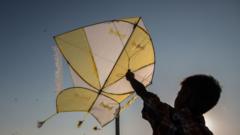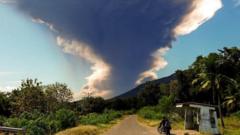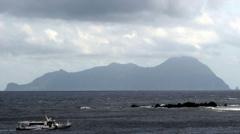On Tuesday night, the Indonesian island of Flores experienced a significant volcanic eruption, with the Mount Lewotobi Laki-laki mountain ejecting ash clouds that reached an altitude of 5,000 meters. Observations indicated that the ash could be seen from as far as 100 miles away, although no injuries have yet been reported.
Volcanic Eruption in Indonesia: Mount Lewotobi Laki-laki Releases Ash Clouds

Volcanic Eruption in Indonesia: Mount Lewotobi Laki-laki Releases Ash Clouds
An explosive event at Mount Lewotobi Laki-laki sends plumes of ash and smoke soaring into the atmosphere.
The volcanic activity stirred anxiety as officials warned residents to maintain a safe distance from the site. Early warning signs were evident hours prior, with increased seismic activity and visible smoke emanating from the volcano, raising concerns over further eruptions. Mount Lewotobi Laki-laki has a history of dangerous eruptions; a previous incident last year claimed the lives of ten individuals.
Indonesia’s volcanic landscape ranks among the world’s most active, with this recent eruption being a reminder of nature's unpredictable power. The local residents are now on high alert as authorities prepare for any potential secondary volcanic events.
Volcanoes like Lewotobi Laki-laki are a distinctive part of Indonesia's geography, with their names reflecting cultural significances— “Laki-laki” meaning "male" in Indonesian, while its neighboring peak, Lewotobi Perempuan, meaning "female", remains more stable and less prone to eruptions. Local communities face the dual challenge of living in close proximity to these majestic yet volatile natural structures.
Indonesia’s volcanic landscape ranks among the world’s most active, with this recent eruption being a reminder of nature's unpredictable power. The local residents are now on high alert as authorities prepare for any potential secondary volcanic events.
Volcanoes like Lewotobi Laki-laki are a distinctive part of Indonesia's geography, with their names reflecting cultural significances— “Laki-laki” meaning "male" in Indonesian, while its neighboring peak, Lewotobi Perempuan, meaning "female", remains more stable and less prone to eruptions. Local communities face the dual challenge of living in close proximity to these majestic yet volatile natural structures.




















